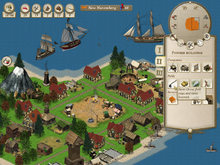Unknown Horizons
| Unknown Horizons | |
|---|---|
 | |
| Developer(s) | The Unknown Horizons Team |
| Engine | Godot, Flexible Isometric Free Engine (up to v2019.1) |
| Platform(s) | Windows, Linux |
| Release | January 2019 (v2019.1), October 2008 (alpha) |
| Genre(s) | City-building, real-time strategy |
| Mode(s) | Single-player, multiplayer |
 A screenshot depicting an early settlement. | |
| Stable release | 2019.1[1] |
|---|---|
| Repository | |
| Engine |
|
| License | GNU GPL v2 |
| Website | www |
Unknown Horizons is a city-building game and real-time strategy game, inspired by the Anno series.[2] It is released under the GNU General Public License (GPLv2) and is therefore free and open source software. Much of the artwork is open content under e.g. CC BY-SA Creative Commons licenses. The game is still under active development; milestone snapshots are released occasionally.
Gameplay
The player guides a group of people settling in a newly discovered archipelago of islands. The player must provide miscellaneous goods (including food, lumber and tools[3]) and public services for the settlers' welfare. The inhabitants in return pay taxes which is the main source of income.
When supplied adequately, the population will grow and the inhabitants will rise to higher social classes. Currently, there are six different settlement levels planned[4] and more than 40 different buildings available.
The starting increment is called "Sailors". Players can set up a basic infrastructure and provide inhabitants with resources such as food. In the second increment "Pioneers", new buildings become available. Buildings begin to look like wooden constructions instead of tents. Increment 3 is named "Settlers" and progress is shown by half-timbered buildings. The remaining three increments "Citizens", "Merchants" and "Aristocrats" are designed, but not yet implemented.
Development
Unknown Horizons originated in the OpenAnno project from 2005 which aimed for being a clone of Anno 1602.[5] The project uses Flexible Isometric Free Engine (FIFE) as game engine and features isometric 2D graphics. Since FIFE also is in development stage and Unknown Horizons is the first major project based on this engine, the developers of Unknown Horizons have agreed to help with development on FIFE. Python was chosen as the language for this project because it is the language best supported by FIFE, guarantees cross-platform compatibility, and allows rapid development. The models for Unknown Horizons are created using Blender and then rendered in four rotations (eight for units).
The first public alpha version was released on October 1, 2008. Development currently focuses on implementing more gameplay content (buildings, resource production lines). Next major steps in development include usability improvements and an island editor.[6]
In 2009 the project was renamed from OpenAnno to Unknown Horizons.[5]
Unknown Horizons took part at the Google Summer of Code 2011 as a mentoring organization[7] and participated again in 2012.[8]
In 2019, the project moved the codebase from Python 2 to Python 3. In addition the developers asked for assistance with porting to the Godot game engine due to concerns that FIFE was no longer in active development.[9][10] A separate GitHub repository was opened to manage the new codebase.[11]
Reception
Unknown Horizons was selected in October 2011 as "HotPick" by Linux Format.[12] Despite its alpha state, Unknown Horizons already appeared in issue 24/09 of the German c't computer magazine, as a part of the Heise software collection 6/09.[13] Between 2009 and 2016 Unknown Horizons was downloaded from SourceForge alone 250,000 times.[14]
See also
References
- ^ http://unknown-horizons.org/blog/second-post/. Retrieved 2 February 2020.
{{cite web}}: Missing or empty|title=(help) - ^ Interview with Thomas Kinnen from Unknown Horizons "When I first saw Unknown Horizons it reminded me of the game Anno. Was this the source of inspiration? Yes, absolutely." by Bill Toulas on osarena.net (2012)
- ^ "Build Your Own Virtual Colony With Unknown Horizons". makeuseof.com. September 15, 2010.
- ^ "Increments - Unknown Horizons - Wiki". Wiki.unknown-horizons.org. 2011-07-24. Archived from the original on 2012-03-27. Retrieved 2011-10-08.
- ^ a b report.pdf
- ^ "Roadmap in project bugtracker". Trac.unknown-horizons.org. Archived from the original on 2012-02-07. Retrieved 2011-10-08.
- ^ "Accepted organizations for Google Summer of Code 2011". Google-melange.com. Archived from the original on 2011-10-10. Retrieved 2011-10-08.
- ^ "Accepted organizations for Google Summer of Code 2012". Google-melange.com. Archived from the original on 2012-04-28. Retrieved 2012-04-30.
- ^ Unknown Horizons (January 12, 2019). "Version 2019.1 released". Retrieved February 18, 2019.
- ^ Unknown Horizons (January 12, 2019). "We are searching godot devs. We want to switch the engine. Because our engine that we still use is not really active. If you have intressting and want to help it would be nice. @godotengine". Twitter. Retrieved January 20, 2019.
- ^ Unknown Horizons. "godot-port". GitHub. Retrieved January 20, 2019.
- ^ Linux Format 149 October 2011 page 72
- ^ "c't - Inhalt 24/2009 - Seite 138". Heise.de. 2011-06-27. Archived from the original on 2011-11-27. Retrieved 2011-11-12.
- ^ unknownhorizons - stats on sourceforge.net
